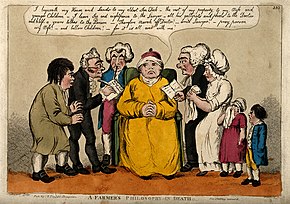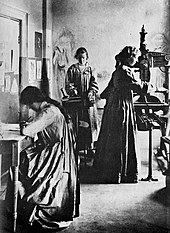Amateur chemistry or home chemistry is the pursuit of chemistry as a private hobby. Amateur chemistry is usually done with whatever chemicals are available at disposal at the privacy of one's home. It should not be confused with clandestine chemistry, which involves the illicit production of controlled drugs. Notable amateur chemists include Oliver Sacks and Sir Edward Elgar.
History
Origins
Amateur chemistry shares its early history with that of chemistry in general. Pioneers of modern chemistry such as Robert Boyle and Antoine Lavoisier were gentlemen scientists who pursued their research independently from their source of income. Only with the coming of the industrial era, and the rise of universities as research institutions, did any significant distinction between amateurs and professionals emerge. Nevertheless, amateur progress lasted well into the 19th century. For example, in 1886, Charles Martin Hall co-invented the Hall-Héroult process for extracting aluminium from its oxide whilst working in a woodshed behind his family home. The history of amateur chemistry ties in well with that of chemistry in general. The history of chemistry represents a time span from ancient history to the present. By 1000 BC, civilizations used technologies that would eventually form the basis to the various branches of chemistry. These processes include extracting metals from ores, making pottery and glazes, fermenting beer and wine, extracting chemicals from plants for medicine and perfume, rendering fat into soap, making glass, and making alloys like bronze.
Chemistry as a hobby
Throughout much of the 20th century, amateur chemistry was an unexceptional hobby, with high-quality chemistry sets readily available, and laboratory suppliers freely selling to hobbyists. For example, Linus Pauling had no difficulty in procuring potassium cyanide at the age of eleven. Many academics, from researchers to university professors, and even Nobel prize laureates, have acknowledged that at least part of their interest in sciences could be traced back to chemistry sets and home labs when they were young. These include Dorothy Hodgkin, Robert F. Curl, George A. Olah, Rudolph A. Marcus, Louis J. Ignarro, Richard Schrock, Roger Y. Tsien, William D. Phillips, Steven Weinberg Peter Licence, etc. However, due to increasing concerns about terrorism, drugs, and safety, suppliers became increasingly reluctant to sell to amateurs, and chemistry sets were steadily toned down. This trend has gradually continued, leaving hobbyists in many parts of the world without access to most reagents.
Home-based chemistry labs were explored as a way to remotely teach students during the COVID-19 pandemic, especially since many local and state-level governments across the world imposed lockdowns or other types of restrictions to contain the spread of the virus.
Notable amateur chemists
- Internet pioneer Vint Cerf, Intel co-founder Gordon Moore, and Hewlett Packard co-founder David Packard all used to practice amateur chemistry.
- British neurologist Oliver Sacks was a keen amateur chemist in his youth, as described in his memoir Uncle Tungsten: Memories of a Chemical Boyhood.
- Nobel Prize winning chemist Linus Pauling practised amateur chemistry in his youth.
- Wolfram Research co-founder Theodore Gray is a keen amateur chemist and element collector. His exploits (most notably the construction of a wooden table in the shape of the periodic table, having compartments holding real samples of each element) earned him the 2002 Ig Nobel prize for chemistry, which he accepted as a great honor. He writes a column for Popular Science magazine, featuring his home experiments.
- Amateur rocketeer (and later NASA engineer) Homer Hickham, together with his fellow Rocket Boys, experimented with a range of home-made rocket propellants. These included "Rocket Candy" made from potassium nitrate and sugar, and "Zincoshine" made from zinc and sulfur held together with moonshine alcohol.
- Composer Sir Edward Elgar practised amateur chemistry from a laboratory erected in his back garden. The original manuscript of the prelude to The Kingdom is stained with chemicals.
- Robert Boyle is largely regarded today as the first modern chemist, and therefore one of the founders of modern chemistry, and one of the pioneers of modern experimental scientific method.
- Maurice Ward, a hairdresser and amateur chemist who invented the thermal insulating material called Starlite.
Restrictions
Whilst the hobby is probably legal in most jurisdictions, the relationship between amateur chemists and law enforcement agencies is often fraught. Hobbyists are often affected by laws intended to fight drugs and terrorism. Furthermore, many chemical supply houses refuse to sell to amateurs, with such policies sometimes being stated openly. Even though the regulations discussed in this section may affect professional and academic laboratories (e.g. business and universities), private individuals, or both, amateur chemists are still affected by those addressed to the former ones, since they usually contain clues that explain the behaviour of these chemical suppliers. Medium-sized suppliers and multinationals have whole departments, sometimes named Compliance or Regulatory affairs, tasked with periodically checking and implementing new regulations regarding chemicals on their companies.
Canada
In Canada, a wide range of basic laboratory reagents such as nitric acid and hydrogen peroxide are restricted as "explosives precursors". Two of the main legal texts in Canada restricting the sale of certain chemicals are the Explosives Act, and the Explosives Regulations, 2013 (SOR/2013-211). Part 20 of the latter restricts the sale, acquisition, and storage of ten explosives precursors, namely, ammonium nitrate in solid form and with a nitrogen concentration >=28%, hydrogen peroxide >=30% conc., nitromethane, potassium chlorate, potassium perchlorate, solid sodium chlorate, nitric acid >= 75% conc., potassium nitrate, mixtures of potassium nitrate and sodium nitrate, and solid sodium nitrate. In 2021, the Canada Gazette published an amendment proposal to the Explosives Regulations, 2013, which suggested measures including the classification of precursors into three tiers, and the addition of calcium ammonium nitrate, hexamethylenetetramine, aluminium powder, and acetone to the precursors list.
In late 2008, Lewis Casey, an 18-year-old college student from Saskatchewan, was arrested for owning a small chemistry lab in his family's garage. After the raid, the police initially claimed that it was a meth lab, but withdrawn the drug charge a few days later. The Crown withdrew criminal charges against him on Oct. 13.
European Union
In the EU, regulations regarding reagent restrictions can be classified in several different sets: dual-use goods, substances in the Schedules 1, 2 and 3 of the CWC, substances on the Common Military List, hazardous chemicals (as defined by Prior Informed Consent Regulation), chemicals subject to the anti-torture regulation, chemicals that cannot be exported to given countries due to sanctions and embargoes, explosives precursors and drug precursors. Those regulations may contain provisions affecting one or more types of "agents" (e.g. manufacturers, resellers, distributors, etc.), end users, or both. Reagent manufacturers typically require customers to sign an end user declaration before accepting and processing the sale of a chemical listed on these schedules.
One of the cornerstones of EU legislation on hazardous chemicals is the Registration, Evaluation, Authorisation and Restriction of Chemicals (REACH), which is defined in Regulation (EC) No. 1907/2006
On the topic of explosives precursors, Regulation (EU) No. 98/2013 introduced rules to harmonize the sale, possession and use of several substances across all EU countries. It requires that each member state must define a National Contact Point to which economic operators must report suspicious transactions, thefts and disappearances of significant quantities involving scheduled substances.
On 1 February 2021, Regulation (EU) 2019/1148 amended REACH and repealed Regulation (EC) No. 98/2013. The newer one is designed to ban the sale and possession of explosives precursors by members of the general public above given concentrations. Any individual can own these chemicals provided their concentration is below or equal to a given limit (e.g. for sulfuric acid up to 15% conc. in weight). Said upper limit allowed can be increased (e.g. for sulfuric acid, up to 40% conc.) by requesting a license to the national authority. Professional users are not affected by these thresholds. However, professional users and members of the general public must also report significant disappearances and thefts of restricted explosives precursors within 24 hours of detection to the national contact point.
| Category | Substance | Upper limit w/o license | Upper limit w/ license |
|---|---|---|---|
| Restricted | Nitric acid | 3% w/w | 10% w/w |
| Hydrogen peroxide | 12% w/w | 35% w/w | |
| Sulphuric acid | 15% w/w | 40% w/w | |
| Nitromethane | 16% w/w | 100% w/w | |
| Ammonium nitrate | 16% w/w of nitrogen in relation to ammonium nitrate (4) | No licensing permitted | |
| Potassium chlorate | 40% w/w | No licensing permitted | |
| Potassium perchlorate | 40% w/w | No licensing permitted | |
| Sodium chlorate | 40% w/w | No licensing permitted | |
| Sodium perchlorate | 40% w/w | No licensing permitted | |
| Reportable | Hexamine | Does not apply | Does not apply |
| Acetone | |||
| Potassium nitrate | |||
| Sodium nitrate | |||
| Calcium nitrate | |||
| Calcium ammonium nitrate | |||
| Magnesium, powders | |||
| Magnesium nitrate hexahydrate | |||
| Aluminium, powders |
Drug precursors: Regulation (EC) No 273/2004 Regulation (EC) No 111/2005 Commission Delegated Regulation (EU) 2015/1011 of 24 April 2015
Regulation (EC) No 273/2004 was amended by Regulation (EU) No 1258/2013, which introduced the term "user", and split reagents on category 2 into categories 2A and 2B
| Category | Substance | Threshold |
|---|---|---|
| Category 1 |
| |
| Subcategory 2A | 0,1 kg | |
| 100 l | ||
| Subcategory 2B | 1 kg | |
| 1 kg | ||
| 0,5 kg | ||
| 100 kg | ||
| Category 3 |
Regarding waste management, it might be considered acceptable to dispose of some acidic or basic solutions by neutralizing and flushing them down the drain, provided that they don't contain other hazardous substances and the reaction products aren't hazardous either. However, other types of wastes must be disposed by handling them to an authorised waste management entity in an appropriate container, usually HDPE jerry cans. Such entities require each container received to be appropriately labeled with several details, which may include GHS hazard pictograms, the EWC (European Waste Catalogue) code, also called LoW (List of Waste) code, that identifies the type of waste. These codes were defined by the Commission Decision 2000/532/EC (CELEX:02000D0532-20150601), later amended by Commission Decision 2014/955/EU (CELEX:32014D0955), which also . Laboratories typically classify their wastes into those containing halogenated solvents (such as chloroform and dichloromethane, EWC 14 06 02), non-halogenated solvents (like hexane and toluene, EWC 14 06 03 or 20 01 13), non-halogenated mineral oils (e.g. from rotary vane vacuum pumps, EWC 13 02 05, or 13 02 08)
Several chemicals, especially solvents, are subject to taxes for certain uses. One such example is ethanol, due to its potential use in alcoholic drinks. Both Council Directive 92/81/EEC, and Council Directive 2003/96/EC, which repealed the former, impose taxes on several hydrocarbons that can be used as fuels. These hydrocarbons include hexane, heptane, isooctane (CN 2901 10 for most saturated acyclic hydrocarbons), petroleum ether (CN 2710 12 25), cyclohexane (CN 2902 11), benzene (CN 2902 20), toluene (CN 2902 30) and xylenes (o-Xylene: CN 2902 41, m-Xylene: CN 2902 42, p-Xylene: CN 2902 43, and a mix of these isomers: CN 2902 44), among others.
Czech Republic
In late 2019, a 42-year-old man was found dead on his apartment in Židenice, Brno. While searching the house, the police found a large amount of chemicals, including half a kilogram of picric acid. As a precautionary measure, the police closed the street and evacuated 80 residents in total while his reagents were being classified and removed. Some tabloids published early speculations hinting at illegal drug production and stating that he might have died of an overdose. However, a friend of his explained he might have been suffering mental health issues, and preliminary results of the autopsy suggested suicide was the most likely cause of his death.
Germany
Regulations regarding hazardous chemicals in this country include the Explosives Act (Sprengstoffgesetz), and the Hazardous Substances Ordinance (Gefahrstoffverordnung, abbreviated as GefStoffV), which is part of the Chemicals Act (Chemikaliengesetz, abbreviated as ChemG).
German amateur chemists have been raided by the police, despite not being in the possession of illegal chemicals.
Spain
According to the Resolution of 20 November 2013 of the Spanish State Secretariat for Security, the National Contact Point for this country is the Intelligence Center for Counter-Terrorism and Organized Crime (CITCO). In addition to EU regulations, explosives precursors are addressed in Law 8/2017, of 8 November, on explosives precursors. On the other hand, drug precursors are addressed by the Law 4/2009, of 15 June, on drug precursors control, and the Royal Decree 129/2017, of 24 February, by which the Drug Precursors Control Regulation is approved. Additionally, the storage of chemicals, including reagents, flammable solvents, and gas cylinders, is regulated by Royal Decree 656/2017, of 23 June.
In general, the topic of hazardous waste management is discussed on Law 22/2011, of 28 July, on wastes and contaminated soils, which was repealed and replaced by Law 7/2022, of 8 April. The transport of wastes is regulated as well, by the Royal Decree 553/2020, of 2 June. Business that meet the definition of 'waste producers' or 'waste management facilities' need to obtain an Environmental Identification Number (Número de identificación medioambiental, NIMA). Said numbers are issued by the government of the autonomous community where the business is located.
Several EU regulations regarding special taxes have been transposed to Spanish regulations in Law 38/1992, of 28 December, of Special Taxes. It was later extended by the Royal Decree 1165/1995, of 7 July, by which the Regulation on Special Taxes is approved. According to article 79 of the latter, even though ethanol is subject to a special tax due to its potential use in spirits, its use in scientific research can be exempted. This exemption requires obtaining an Activity and Establishment Code (Código de Actividad y del Establecimiento, CAE), which allows to request a refund from the Tax Agency (Agencia Tributaria) by submitting a filled form model 572. Said code is composed of 13 characters, the first two being "ES", then three zeros, two characters identifying the local management office, two more characters for the activity, a sequential inscription number made up of three characters, and finally a control letter. A refund can also be requested for the special tax on hydrocarbons as long as they aren't used as fuels, according to article 109 the same Royal Decree (1165/1995, of 7 July).
Norway
In September 2018, a 29-year-old physician and amateur chemist and his girlfriend were arrested at their home on in Nord-Jæren, two days after inquiring a local pharmacy about the availability of 35% hydrogen peroxide. He explained that he had an accident while camping, suffering a wound that he stitched himself. Being a physician and seeing the effect of flame-sterilizing on his surgical instruments, he was looking for a milder alternative that could also be used to disinfect wounds. However, his enquiry triggered the submission of an alert to KRIPOS, which sent a few police officers to the house. These officers would, in turn, find the chemicals from his lab, and arrest him.
One law in this country that regulates flammable chemicals, gas cylinders, and explosive substances is the Fire and Explosion Protection Act (Brann- og eksplosjonsvernloven).
United Kingdom
In the UK it is a criminal offence for members of the general public to purchase, and for business to sell, certain types of poisons or explosives precursors to those of the former group without a valid EPP license. Purchasing substances on this list is restricted since 26 May 2015, and its possession is also restricted since 3 March 2016. Since July 1st 2018, the acquisition of sulphuric acid in concentrations above 15% in weight by members of the general public also requires an EPP licence, which has impacted lead-acid battery sellers.
Some regulations regarding restricted chemicals in this country include the Poison Act 1972, which was amended by the Deregulation Act 2015, and the Control of Poisons and Explosives Precursors Regulations 2015.
United States
In the United States, the Drug Enforcement Administration maintains lists regarding the classification of illicit drugs, which contain chemicals that are used to manufacture the controlled substances/illicit drugs. The lists are designated within The Controlled Substances Act, 21 U.S.C. § 802, paragraphs 34 (list I) and 35 (list II). Additionally, some regions have stringent regulations concerning the ownership of chemicals and equipment. For example, Texas once required the registration of even the most basic laboratory glassware. However, this requirement was repealed on June 6, 2019.
United Nuclear, an amateur science supplier based in New Mexico was raided in June 2003 at the behest of the U.S. Consumer Product Safety Commission, and subsequently fined $7,500 for "Selling Illegal Fireworks Components".
In 2008, the home laboratory of Victor Deeb, a retired chemist, was raided and dismantled
Almost a year later, Jack Robison, then a 19-year-old chemistry student at the Holyoke Community College, received a visit from members of the Massachusetts State Police, the Bureau of Alcohol, Tobacco, Firearms and Explosives, and the FBI. They asked him questions regarding several videos on small-scale experiments he had posted two years earlier on YouTube involving energetic materials, including PETN, potassium nitrate, and RDX, and wanted to check his mother's house basement. He was initially charged with three counts of malicious explosion and one count of possessing explosives with the intent to harm people or property, facing up to 60 years in prison, but was found innocent after trial.













